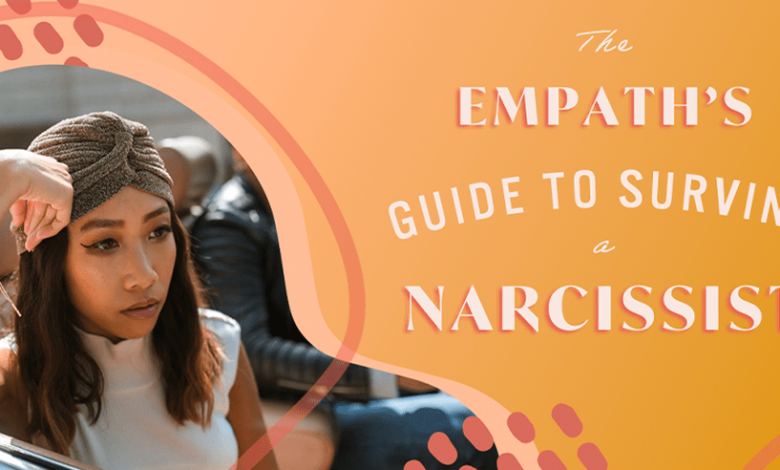The Empath’s Guide to Surviving a Narcissist

The Empath’s Guide to Surviving a Narcissist
- Introduction: Defining Empaths and Narcissists
In the intricate dance of human relationships, few dynamics are as challenging and perplexing as the one between empaths and narcissists. Empaths are susceptible individuals who experience the emotions of others as if they were their own. They possess an innate ability to sense the emotional energy around them, often leading them to be compassionate and understanding. Meanwhile, narcissists are characterized by an inflated sense of self-importance, a need for excessive admiration, and a lack of empathy for others. This guide aims to empower empaths with the knowledge and tools needed to navigate relationships with narcissists effectively.
- Understanding the Dynamic: Why Empaths Attract Narcissists
The relationship between empaths and narcissists can be likened to a moth drawn to a flame. Empaths’ natural inclination to help and heal makes them attractive to narcissists, who thrive on attention and validation. Narcissists often exploit empaths’ kindness, manipulating their emotions to fulfill their own needs. Understanding this dynamic is crucial for empaths to recognize the patterns and protect themselves from emotional harm.
- Signs of a Narcissistic Relationship: How to Identify and Acknowledge
Recognizing a narcissistic relationship can be challenging, especially for empaths who may struggle to see the negative traits in others. Key signs include:
- Constant Need for Admiration: Narcissists require continuous praise and validation.
- Lack of Empathy: They show little concern for your feelings or needs.
- Manipulative Behavior: They control you through guilt, shame, or fear.
- Gaslighting: They distort reality, making you question your sanity.
- Exploitation: They take advantage of your kindness and generosity without reciprocation.
Acknowledging these signs is the first step towards taking back control and protecting your emotional well-being.
- Coping Mechanisms for Empaths: Strategies for Survival and Healing
Surviving a relationship with a narcissist requires empaths to develop effective coping mechanisms. Some strategies include:
- Grounding Techniques: Stay centered by practicing mindfulness, meditation, or deep breathing exercises.
- Self-Care: Prioritize activities that nourish your mind, body, and soul.
- Emotional Detachment: Learn to separate your emotions from those of the narcissist.
- Assertiveness Training: Strengthen your ability to say no and stand up for yourself.
These techniques can help empaths maintain their emotional equilibrium and reduce the impact of the narcissist’s behavior.
- Setting Boundaries: Practical Tips for Protecting Yourself
Setting and enforcing boundaries is essential for empaths to protect themselves from narcissistic abuse. Here are some practical tips:
- Define Your Limits: Identify what behaviors are unacceptable to you.
- Communicate Assertively: Use “I” statements to express your needs and boundaries.
- Be Consistent: Enforce your boundaries, even if it means facing resistance.
- Seek Professional Help: Consider working with a therapist to develop and maintain healthy boundaries.
By establishing firm boundaries, empaths can safeguard their emotional well-being and reduce the narcissist’s power over them.
- Seeking Support: The Importance of a Strong Support Network
A strong support network is vital for empaths to navigate the challenges of a narcissistic relationship. Surround yourself with friends, family, or support groups who understand your experiences and can offer validation and encouragement. These connections provide a safe space to share feelings, gain perspective, and receive practical advice. Remember, you don’t have to face this journey alone.
- Moving Forward: Rebuilding After a Narcissistic Relationship
Healing from a narcissistic relationship takes time and effort, but it is possible. Focus on rebuilding your sense of self and reclaiming your power. Engage in activities that bring you joy, pursue personal growth and practice self-compassion. Consider seeking therapy to process your experiences and develop healthy relationship patterns. You’ll regain confidence as you heal and discover your strength to create a healthier, more fulfilling future.
- Conclusion: Empowerment and Healing for Empaths
Surviving a relationship with a narcissist is undoubtedly challenging, but it also offers an opportunity for growth and empowerment. By understanding the dynamics, recognizing the signs, and implementing effective coping strategies, empaths can protect their emotional well-being and emerge more vital than ever. Remember, you can set boundaries, seek support, and rebuild your life. Trust in your inner strength and embrace the journey of healing and self-discovery.
Empaths, it’s time to take control and thrive.
—
By following these guidelines and insights, empaths can navigate the complexities of relationships with narcissists and emerge more resilient and empowered. If you found this guide helpful, please share it with others who might benefit from these insights. Consider joining our community of empaths committed to healing and growth for more resources and support.
